新概念英语第二册第1课课件
新概念英语第二册第一课

Attention
n. 注意
Attention, please. pay a little/some/more/no /close/great/enough attention pay attention to sth draw one’s attention That’s all, thank for your attention
6. He had a good seat. He was sitting in a good( ). A. chair b. place c. armchair d. class 7. He was a young man. He wasn’t very ( ) A. old b. big c. tall. d. large 8. The writer looked at the man and the woman angrily. He was very ( ) A. sad b. unhappy c. cross d. pleased 9. The writer could not bear it. He could not ( )it. A. carry b. suffer c. stand d. lift 10. The young man spoke rudely. He wasn’t very A. clever b. rude c. polite d. kind
Where there is a will, there is a way.
言归正传Get down to business
Lesson 1
A
private conversation
新概念英语第二册第一课最全讲义
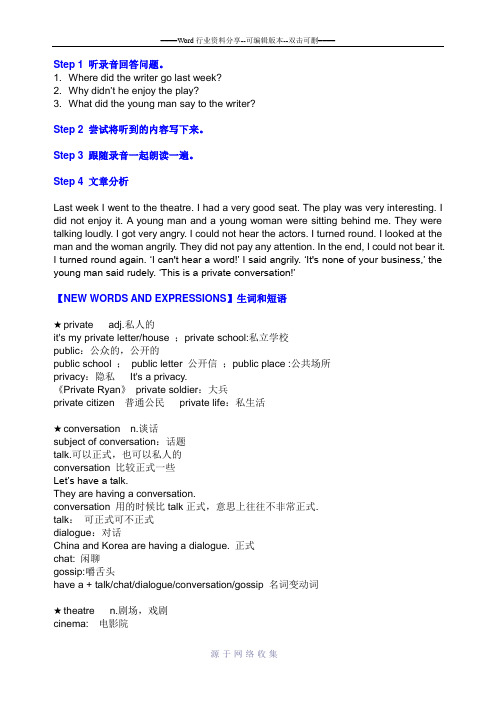
Step 1 听录音回答问题。
1. Where did the writer go last week?2. Why didn’t he enjoy the play?3. What did the young man say to the writer?Step 2 尝试将听到的内容写下来。
Step 3 跟随录音一起朗读一遍。
Step 4 文章分析Last week I went to the theatre. I had a very good seat. The play was very interesting. I did not enjoy it. A young man and a young woman were sitting behind me. They were talking loudly. I got very angry. I could not hear the actors. I turned round. I looked at the man and the woman angrily. They did not pay any attention. In the end, I could not bear it.I turned round again. ‘I can't hear a word!’ I said angrily. ‘It's none of your business,’ the young man said rudely. ‘This is a private conversation!’【NEW WORDS AND EXPRESSIONS】生词和短语★private adj.私人的it's my private letter/house ;private school:私立学校public:公众的,公开的public school ;public letter 公开信;public place :公共场所privacy:隐私It's a privacy.《Private Ryan》private soldier:大兵private citizen 普通公民private life:私生活★conversation n.谈话subject of conversation:话题talk.可以正式,也可以私人的conversation 比较正式一些Let’s have a talk.They are having a conversation.conversation 用的时候比talk正式,意思上往往不非常正式.talk:可正式可不正式dialogue:对话China and Korea are having a dialogue. 正式chat: 闲聊gossip:嚼舌头have a + talk/chat/dialogue/conversation/gossip 名词变动词★theatre n.剧场,戏剧cinema: 电影院★seat n.座位have a good seat(place)take a seat : 座下来,就座take your seat/take a seatIs the seat taken? 这个座位有人吗?no/yessit Sit down ,pleaseseat Take your seat, please.Be seated, please 更为礼貌seat是及物动词,后面有宾语sit是不及物动词,后面不加宾语seat后面会加人; seat sb; seat him; seat:让某人就座sit he is sitting there.you seat him;〖语法精粹〗When all those present__, he began his lecture.A. sitB. seatC. seatedD. were seatedsit, sit down; seat, be seated; take a seat★play n.戏★loudly adv. 大声的★angry adj. 生气的cross=angry ; I was angry. He was cross.Don't get cross with me, it wasn't my fault.不要对我生气,那不是我的错。
新概念二第一课课件Lesson 1 A private conversation

4. seat n.座位 v.安排坐下,使就坐 have a seat/take a seat 就座 (比sit down更有礼貌) have a good seat 有一个好位置 辨析:seat/sit seat只做及物动词,sit可做及物动词也可做 不及物动词 be seated 坐着,坐下;位于
新概念英语 二
welcome
主讲老师:Arthur
新概念英语二
新概念英语第二册共计96课,分4个单元(每24课一 个单元)前两个单元是对新一语法的操练和重现;第三 个单元较难,是一些复合句,第四个单元为复习单元, 每单元有一个综合考试。 新二是我们学习英语的一个过渡,同时也是一个转变。 从一个会说日常英语的人转变成一个敢动笔进行基本写 作的人。以96篇小故事为素材,培养学生听、说、读、 写的基本能力,其优势在于扩充词汇、统揽语法、集合 实践、听说兼修。在掌握第一册基本语法的基础上,由 浅入深逐步讲解语法要点,使学习者轻松掌握枯燥的语 法;通过对句型结构的分析及对短语用法的讲解,使学 习者在真正的听说读写中运用地道的句型。
问题是你想要做什么
二、主语———动词 在这一句型中,动词为不及 物动词及不及物的动词词组。在有的句子中,不 及物动词可以有状语修饰。 1.The sun is rising. 2.I'll try. 3.Did you sleep well?(well做状语,修饰不及物 动词sleep) 4.The engine broke down. 注意:在此句型中, 有少数不及物动词表达被动含义,表达主语本身 所具有的特性,不用被动语态。 1.The book sells well. 2.The window won't shut. 3.The pen writes smoothly.
《新概念英语》第二册 电子版
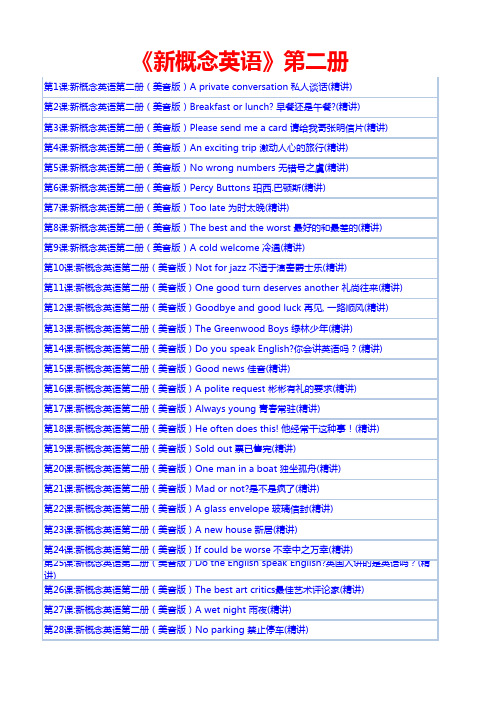
《新概念英语》第二册第1课:新概念英语第二册(美音版)A private conversation 私人谈话(精讲)第2课:新概念英语第二册(美音版)Breakfast or lunch? 早餐还是午餐?(精讲)第3课:新概念英语第二册(美音版)Please send me a card 请给我寄张明信片(精讲)第4课:新概念英语第二册(美音版)An exciting trip 激动人心的旅行(精讲)第5课:新概念英语第二册(美音版)No wrong numbers 无错号之虞(精讲)第6课:新概念英语第二册(美音版)Percy Buttons 珀西.巴顿斯(精讲)第7课:新概念英语第二册(美音版)Too late 为时太晚(精讲)第8课:新概念英语第二册(美音版)The best and the worst 最好的和最差的(精讲)第9课:新概念英语第二册(美音版)A cold welcome 冷遇(精讲)第10课:新概念英语第二册(美音版)Not for jazz 不适于演奏爵士乐(精讲)第11课:新概念英语第二册(美音版)One good turn deserves another 礼尚往来(精讲)第12课:新概念英语第二册(美音版)Goodbye and good luck 再见, 一路顺风(精讲)第13课:新概念英语第二册(美音版)The Greenwood Boys 绿林少年(精讲)第14课:新概念英语第二册(美音版)Do you speak English?你会讲英语吗?(精讲)第15课:新概念英语第二册(美音版)Good news 佳音(精讲)第16课:新概念英语第二册(美音版)A polite request 彬彬有礼的要求(精讲)第17课:新概念英语第二册(美音版)Always young 青春常驻(精讲)第18课:新概念英语第二册(美音版)He often does this! 他经常干这种事!(精讲)第19课:新概念英语第二册(美音版)Sold out 票已售完(精讲)第20课:新概念英语第二册(美音版)One man in a boat 独坐孤舟(精讲)第21课:新概念英语第二册(美音版)Mad or not?是不是疯了(精讲)第22课:新概念英语第二册(美音版)A glass envelope 玻璃信封(精讲)第23课:新概念英语第二册(美音版)A new house 新居(精讲)第24课:新概念英语第二册(美音版)If could be worse 不幸中之万幸(精讲)第25课:新概念英语第二册(美音版)Do the English speak English?英国人讲的是英语吗?(精讲)第26课:新概念英语第二册(美音版)The best art critics最佳艺术评论家(精讲)第27课:新概念英语第二册(美音版)A wet night 雨夜(精讲)第28课:新概念英语第二册(美音版)No parking 禁止停车(精讲)第29课:新概念英语第二册(美音版)Taxi! 出租汽车(精讲)第30课:新概念英语第二册(美音版)Football or polo? 足球还是水球?(精讲)第31课:新概念英语第二册(美音版)Success story 成功者的故事(精讲)第32课:新概念英语第二册(美音版)Shopping made easy 购物变得很方便(精讲)第33课:新概念英语第二册(美音版)Out of the darkness 冲出黑暗(精讲)第34课:新概念英语第二册(美音版)Quick work 破案 “神速”(精讲)第35课:新概念英语第二册(美音版)Stop thief!捉贼!(精讲)第36课:新概念英语第二册(美音版)Across the Channel 横渡海峡(精讲)第37课:新概念英语第二册(美音版)The Olympic Games 奥林匹克运动会(精讲)第38课:新概念英语第二册(美音版)Everything except the weather 唯独没有考虑到天气(精讲第39课:新概念英语第二册(美音版)Am I all right? 我是否痊愈?(精讲)第40课:新概念英语第二册(美音版)Food and talk 进餐与交谈(精讲)第41课:新概念英语第二册(美音版)Do you call that a hat? 你把那个叫帽子吗?(精讲)第42课:新概念英语第二册(美音版)Not very musical 并非很懂音乐(精讲)第43课:新概念英语第二册(美音版)Over the South Pole 飞越南极(精讲)第44课:新概念英语第二册(美音版)Through the forest 穿过森林(精讲)第45课:新概念英语第二册(美音版)A clear conscience 问心无愧(精讲)第46课:新概念英语第二册(美音版)Expensive and uncomfortable 既昂贵又受罪(精讲)第47课:新概念英语第二册(美音版)A thirsty ghost 嗜酒的鬼魂(精讲)第48课:新概念英语第二册(美音版)Did you want to tell me something? 你想对我说什么吗?第49课:新概念英语第二册(美音版)The end of a dream 美梦告终(精讲)第50课:新概念英语第二册(美音版)Taken for a ride 乘车兜风(精讲)第51课:新概念英语第二册(美音版)Reward for virtue 对美德的奖赏(精讲)第52课:新概念英语第二册(美音版)A pretty carpet 漂亮的地毯(精讲)第53课:新概念英语第二册(美音版)Hot snake 触电的蛇(精讲)第54课:新概念英语第二册(美音版)Sticky fingers 粘糊的手指(精讲)第55课:新概念英语第二册(美音版)Not a gold mine 并非金矿(精讲)第56课:新概念英语第二册(美音版)Faster than sound! 比声音还快!(讲解)第57课:新概念英语第二册(美音版)Can I help you, madam? 您要买什么,夫人?(精讲)第58课:新概念英语第二册(美音版)A blessing in disguise? 是因祸得福吗?(精讲)第59课:新概念英语第二册(美音版)In or out? 进来还是出去?(精讲)第60课:新概念英语第二册(美音版)The future 卜算未来(精讲)第61课:新概念英语第二册(美音版)Trouble with the Hubble 哈勃望远镜的困境(讲解)第62课:新概念英语第二册(美音版)After the fire 大火之后(精讲)第63课:新概念英语第二册(美音版)She was not amused 她并不觉得好笑(精讲)第64课:新概念英语第二册(美音版)The Channel Tunnel 海峡隧道(精讲)第65课:新概念英语第二册(美音版)Jumbo versus the police 小象对警察(精讲)第66课:新概念英语第二册(美音版)Sweet as honey! 像蜜一样甜!(精讲)第67课:新概念英语第二册(美音版)Volcanoes 火山(精讲)第68课:新概念英语第二册(美音版)Persistent 纠缠不休(精讲)第69课:新概念英语第二册(美音版)But not murder!并非谋杀!(精讲)第70课:新概念英语第二册(美音版)Red for danger 危险的红色(精讲)第71课:新概念英语第二册(美音版)A famous clock第72课:新概念英语第二册(美音版)A car called bluebird第73课:新概念英语第二册(美音版)The record-holder第74课:新概念英语第二册(美音版)Out of the limelight第75课:新概念英语第二册(美音版)SOS第76课:新概念英语第二册(美音版)April Fools Day第77课:新概念英语第二册(美音版)A successful operation第78课:新概念英语第二册(美音版)The last one?第79课:新概念英语第二册(美音版)By air第80课:新概念英语第二册(美音版)The Crystal Palace第81课:新概念英语第二册(美音版)Escape第82课:新概念英语第二册(美音版)Monster or fish?第83课:新概念英语第二册(美音版)After the elections第84课:新概念英语第二册(美音版)On strike第85课:新概念英语第二册(美音版)Never too old to learn第86课:新概念英语第二册(美音版)Out of control第87课:新概念英语第二册(美音版)A perfect alibi第88课:新概念英语第二册(美音版)Trapped in a mine第89课:新概念英语第二册(美音版)A slip of the tongue 第90课:新概念英语第二册(美音版)What第91课:新概念英语第二册(美音版)Three men in a basket 第92课:新概念英语第二册(美音版)Asking for trouble第93课:新概念英语第二册(美音版)A noble gift第94课:新概念英语第二册(美音版)Future champions第95课:新概念英语第二册(美音版)A fantasy第96课:新概念英语第二册(美音版)The dead return。
新概念英语第二册第1课

1、Last week I went to the theatre.
• 动词go的原义是离开一个地方去另一个地方,与介 词to连用后,常加上主语所要去的目的来代表主语 的动作目的。 • go to the +地点 表示去某地干嘛 • go to the theatre = go to the theatre to see a play去剧 场看戏 • go to the cinema =see a film 去电影院看电影 • go to the dairy 去牛奶店 • go to the + 人 + 's 表示去这个人开的店 • go to the doctor's 去看病;go to the butcher's 买肉
Lesson 1
A Private Conversation
Last week I went to the theatre. I had a very good seat. The play was very interesting. I did not enjoy it. A young man and a young woman were sitting behind me.They were talking loudly. I got very angry. I could not hear the actors. I turned round. I looked at the man and the woman angrily. They did not pay any
★business n. 事, 生意
• • • • • • • • ① n. 生意 business man :生意人 do business: 做生意 go to some place on business:因公出差 I went to Tianjin on business. ② n. 某人自己的私人的事情 It's my business. (指私人的事, 自己处理的事) It's none of your business. 不关你的事。
新概念英语第二册Lesson1课件
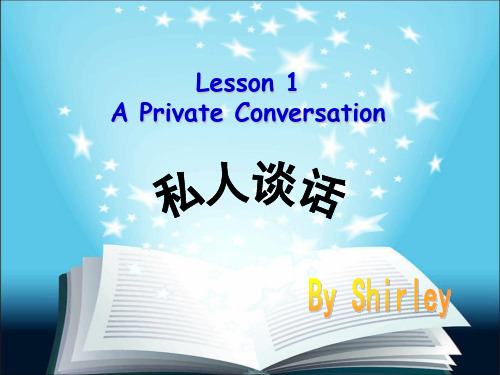
I could not hear the actors.
Key structures and usage
过去进行时:过去某个时间正在进行 或发生的动作 A young and a young woman were sitting behind me.
They were talking loudly.
• • • • • • • • • • • • • • •
【Key structures】 简单陈述句的语序 陈述句一定是有主语,有动词,有宾语,有句号 6 1 2 3 4 5 6 when? Who? Action Who? How? Where? When? Which? Which? What? What? 1 ---主语,一般由名词、代词或名词短语构成,通常位于动词之前,动词必 须与主语一致,即主语决定动词的单复数形式 2 ---谓语,由动词充当 3 ---宾语,一般为名词、代词或名词短语 4 ---副词或介词短语,对方式或状态提问,往往做状语 I like her very much 5 ---地点状语,一般在方式副词之后,时间副词之前 6 ---时间状语,可以放在句首或句末 简单陈述句一定不能少的是主语, 谓语. 如果问何时何地,是一个固定搭配 when and where
• • • • • •
★business n. 事, 生意 ① n. 生意 business man :生意人 do business: 做生意 ② n. 某人自己的私人的事情 It's my business. (指私人的事, 自己处理的 事) • It's none of your business. 不关你的事。
Language points
以下短语中名词前不加冠词:
新概念第二册ppt课件

• 以下短语中名词前不加冠词与加冠词意思有区别 • go to school 去上学; go to the school 去学校; • go to hospital去看病; go to the hospital去医院
3、I did not enjoy it. enjoy vt. 欣赏,享受,喜爱 ① enjoy +n. 喜欢,从当中得到一种享受(后面不能跟人) eg. I enjoy the music. enjoy the dinner\film\game ② enjoy oneself/代词 玩的开心 eg. We always enjoy ourselves. ③ enjoy +动名词 eg. Jane doesn’t enjoy swimming.
【课文讲解】
1、Last week I went to the theatre. • go to the +地点 表示去某地干什么事 • go to the theatre = go to the theatre to see a play去剧 场看戏 • go to the cinema =see a film 去电影院看电影
+ to sb. \ sth.
★business n. 事, 生意 • ① n. 生意 • businessman 生意人 • businesswoman • do business: 做生意 • go to some place on business:因公出差 eg. I went to Tianjin on business.
Lesson30Footballorpolo_(课件)新概念英语第二册(1)
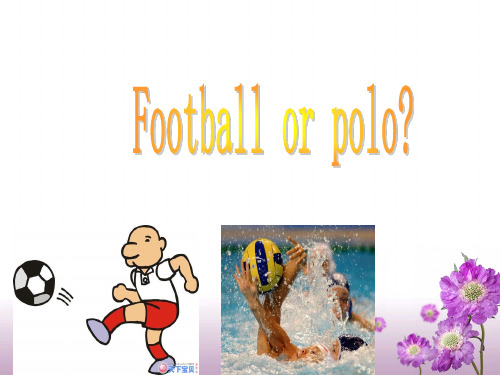
• 在天气晴朗的下午 on fine afternoons • 在威尔河边 by the Wayle • 我喜欢在天气晴朗的下午到河边坐坐。
• I like sitting by the Wayle on fine afternoons.
• 和往常一样as usual 河边river bank
• 上星期日天气很暖和。于是我和往常一样,又去 河边坐着。
• out of sight 在视线之外 • in sight 在视线之内
眼不见心不烦 out of sighe river bank [bANk] n.岸; 堤 • bank 银行
• towards prep. 朝, 向
• He walked towards me.
2. What were some children doing?
3. What happened to the man in the boat?
• 威尔 The wayle 横穿 cut across • 威尔河是横穿过我家附近公园的一条小河。
• The wayle is a small river that cuts across the park near my home.
Check
• Words and Phrases of Lesson 28,29 • Reciting of one lesson.
polo [‘pəuləu] n. 水球 Wayle [weil ] n. 威尔(河名) cut [kʌt] (cut, cut)v. 穿过 row [rəu] v. 划(船) kick [kik] v. 踢 towards [tə'wɔ:dz] prep. 朝,向 nearly ['niəli] adv. 几乎 sight [sait] n. 眼界,视域
新概念英语第二册-第一课
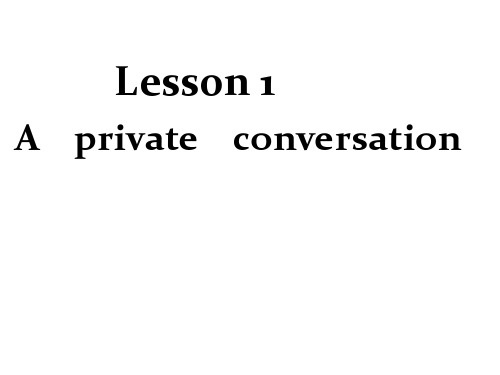
5. _W__a_s_____ (be) it cold in your city
yesterday?
过去进行时
表示在过去某一时刻或某一段时间
内正在进行或发生的动作。
1.构成 : “主语+was/were + 现在分词” 2. 否定形式: “主语+was/were not +现在分词” 3. 疑问句形式: “was/were + 主语+ 现在分词”
He went to the theater. 2. Why did the writer complain
(抱怨)to the people behind
him?
Because they were talking loudly.
Turn to P15 两道选择理解题
讲解课文 P15 句型和词汇选择题
陈述句:陈述一个事实,句末用句 号,分为肯定句和否定句。
简单陈述句:陈述一个事实的简单 句
主语+谓语动词+宾语+ 状语(时间/地点/方式)
时间状语即可以放在句首 也可以放句尾
汉语的语序: 什么人+什么时间+什么地点+怎样做+为什么做+做什么
我爸爸今天早上在家里很认真地为我做了一个汽车模型。
英语的语序: 什么人+做什么+为什么做+怎样做+什么地点+什么时间
My father made a car model for me carefully at home this morning.
做P14 B 句子排序 做P15最下面 句子排序
Grammar: 一般过去时
《新概念英语》第二册第1课

Lesson 1 A private conversation一:New words:1:private adj.=personal: This is a private conversation.a private exhibition The wedding will be private. private study 自学in sb’s private life2: conversation :to have a conversation with sb to interrupt a conversation a conversation about sb be in conversation3:theater=theatre: Did you go to the theater last night? Have you bought a theater ticket?4: seat: n. take a seat=have a seat=take one’s seat Take your seat=sit down vt.常用被动形式表示主动意义He is seated between Jack and Tom. Please be seated.=Please seat yourself.sit vt.: The students are sitting at their desks. Don’t sit here, please sit there.5:play: 1): vi. Tom is playing with a lovely dog. Children like to play.She plays at the National Theater tonight. Don’t play with fire. It’s dangerous.2):vt.: He plays golf nearly every weekend. The children are playing doctors and nurses.3):n. All work and no play is no fun. How did you enjoy the TV play?play the piano/guitar/flute/violin/accordion(手风琴) play some musicplay basketball/football/volleyball/bridge play cards/chess play a joke/trick on sb6: loudly=loud. 喧闹,嘈杂Suddenly the bell on the wall rang loudly. Don’t shout so loud, your father is sleeping.Loud: 响亮地,大声。
(完整)新概念英语第二册第一课(包含课文、练习及)

go to the cinema =see a film 去电影院看电影
go to the dairy 去牛奶店
go to the + 人 + 's 表示去这个人开的店
Seat n。 座位
这个座位有人么?Is anyone here? /Is this seat taken, please?
vt。 使就坐
结构:seat oneself 常用be seated形式.
We were seated at the table。
All of us were seated around the table and Aunt Pat served spaghetti for supper.
‘It's none of your business,' the young man said rudely. ‘This is a
private conversation!'
New words and expressions 生词和短语
private adj. 私人的
conversation n。 谈话
enjoy +代词,一般为反身代词
enjoy oneself =have a good time 玩的很开心,过的很愉快
e.g。 I enjoyed myself last night。/I had a good time last night。
③ enjoy +动名词
Jane doesn't enjoy swimming。 She enjoys going to the theatre.
新概念英语第二册-lesson1课件

12 There are a lot of people at the bus stop. 13 The little boy ate greedily an apple in the
kitchen this morning. 14 She draws beautifully. 15 I like music very much. 16 They built a new school in our village last year. 17 The match ended at four o'clock. 18 She received a letter from her brother last week.
3. The play was very interesting.
[参考翻译] 那场戏剧演得非常有意 思。
[语言点] very 为副词,interesting为 形容词,副词修饰形容词一般放在 其前面。
比如: very hot非常热, quiet easy 十分简单,但good enough 为例外。
have a conversation about sth. 例:Shall we have a conversation
about your vacation ?
同义词:
conversation 无拘束或非正式的 谈话
talk
谈话内容可正式或非正式
chat
闲谈、聊天
discussion (小型的)讨论、商议
like意义要深得多。 enjoy music享受音乐, enjoy dinner享受宴会, enjoy life享受生活
② enjoy doing enjoy swimming 喜欢游泳, enjoy fishing喜爱钓鱼 ③ 一般不可说enjoy sb This morning I enjoyed my English
新概念英语第二册课课件 Lesson

•A public house which was recently bought by Mr. Ian Thompson is up for sale.
•a public house 酒吧、酒店,口语缩略为pub •up for sale 有待出售,供出售 •be up for 有待于…,为了某一目的 •This problem is up for discussion. •这个问题有待于讨论。 •on sale 打折卖 for sale 待售;出售
• ★shake(shook,shaken) v. 摇动 • vt.&vi. 摇,摇动,抖动 • Mr. Thompson shook his head. • His hands appear to be shaking. • 他的手看上去在发抖。 • ② vt. 同…握手 • Dan shook hands with him.
A public house which was recently bought by Mr. Ian Thompson is up for sale. Mr.Thompson is going to sell coming from the bar. The next morning, he found that the doors had been blocked by chairs and the furniture had been moved. Though Mr.Thompson had turned the lights off before he went to bed, they were on in the morning.He also said that he had found five empty whisky bottles which the ghost must have drunk the night before. When I suggested that some villagers must have come in for a free drink, Mr.Thompson shook his head. The villagers have told him that they will not accept the pub even if he gives it away.
新概念英语第二册第1课
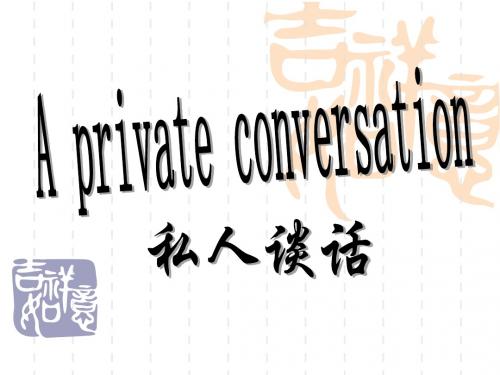
was
I A young man and a yound woman They
did not enjoy
were sitting were talking
behind me.
loudly.
简单陈述句的语序
主语+谓语动词+宾语+方式状语+ 地点状语+时间状语
PS:时间状语可以置于开头 例:I read books carefully in the library yesterday morning. = Yesterday morning, I read books carefully in the library.
背景拓展 Attention ! 立正 At ease ! 稍息
8. bear v.(bore /borne)容忍 承受 负担 n.熊 例:我无法容忍他的爆脾气。 I can ’t bear his hot temper. bear hug 熊抱 give sb. a bear hug热情的拥抱 辨析:bear/stand /put up with/tolerate bear/stand忍受,遭受,前者语气较轻,二者常混用 (在否定句或疑问句中常于can/could连用) I can't bear/stand the factory's noise. put up with 忍受,容忍(常用于口语中) I'll have to put up with the noise till I move next week. tolerate 指不提出反对意见的容忍 He can't tolerate his sister's bad habits, but he said nothing.
新概念英语第二册第1课ppt课件
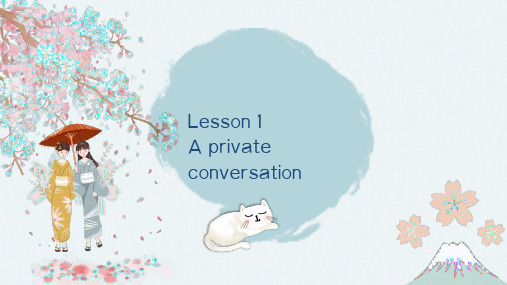
.
n. privacy 隐私.
It's my privacy. It's none of your business!
【反】 public adj. 公共的,公开的 .
New words
conversation n. 对话,谈话
.
have a conversation with sb 和某人有一个谈话 .
New words seat n. 座位 vt. 安排......坐下
. Have/take a/one's seat 请坐
..
请坐的2种说法 : Sit down,please.(命令性) Take your seat,please. (更礼貌)
New words angry adj. ___生__气__的_
Text
‘It's none of your business,' the young man said rudely. 'This is a private conversation!'.
Part 3 Grammar
Grammar
一、主+谓(谓语为不及物动词) The sun rises. He left.
ቤተ መጻሕፍቲ ባይዱ
--
angrily adv.生气地
--
rudely adv.无礼地,粗鲁地
New words
形容词变副词的规则:
1.一般情况下直接加“ly” quick---quickly, loud--loudly, real-really, slow-slowly, careful-carefully 2.以辅音字母加y结尾的变y为i,然后再加-ly happy---happily, easy-easily, busy-busily 3.少数以e结尾的形容词,要去掉e再加-ly true-truly, terrible-terribly,possible-possibly 但绝大多数以e结尾的形容词仍然直接加-ly。例如:rude-rudely, polite-politely, widewidely等。
(完整版)新概念英语第二册第一课(包含课文、练习及)
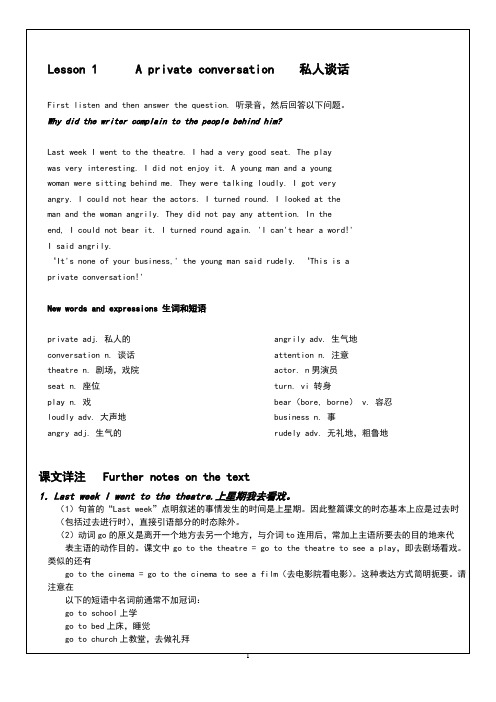
enjoy vt. 欣赏,享受,喜爱 后面的宾语为名词、代词、动名词
① enjoy +n. 喜欢,从当中得到一种享受(后面不能跟人)
I enjoy the music.
enjoy the dinner/film/program/game
② enjoy oneself/代词 玩的开心
Seat n. 座位
这个座位有人么?Is anyone here? /Is this seat taken, please?
vt. 使就坐
结构:seat oneself 常用be seated形式。
We were seated at the table.
All of us were seated around the table and Aunt Pat served spaghetti for supper.
was(be 系动词) “是”
句子结构:主语+系动词(was)+表语
interestinga. 有趣的
interesteda. 感兴趣的 be interested in
I was very interested in the play.
interestn.
take an interest in
I took a great interest in the play.
3.The play was very interesting. 戏很有意思。
interesting属于现在分词形式的形容词,意思是“使人感兴趣”。
它通常与非人称主语连用或修饰某个事物:
This is an interesting book/idea. 这是一本有趣的书/一个令人感兴趣的主意。
- 1、下载文档前请自行甄别文档内容的完整性,平台不提供额外的编辑、内容补充、找答案等附加服务。
- 2、"仅部分预览"的文档,不可在线预览部分如存在完整性等问题,可反馈申请退款(可完整预览的文档不适用该条件!)。
- 3、如文档侵犯您的权益,请联系客服反馈,我们会尽快为您处理(人工客服工作时间:9:00-18:30)。
4. seat n.座位 v.安排坐下,使就坐 have a seat/take a seat 就座 (比sit down更有礼貌) have a good seat 有一个好位置 辨析:seat/sit seat只做及物动词,sit可做及物动 词也可做不及物动词
5. play n.戏 v.玩 play… with 和…玩 player 运动员,比赛者 playboy花花公子 6. angry adj. 生气的 angrily adv. be angry with sb. 跟…生气 7. attention n.注意 pay attention to sb./sth. at=ad(向,趋向)+tent(伸,拉)+ion (行为)---把身心去向某人某事—关注, 注意 draw/catch one’s attention 吸引某人注意
二、主语———动词 在这一句型中,动词为 不及物动词及不及物的动词词组。在有的 句子中,不及物动词可以有状语修饰。 1.The sun is rising. 2.I'll try. 3.Did you sleep well?(well做状语,修饰不 及物动词sleep) 4.The engine broke down. 注意:在此句型 中,有少数不及物动词表达被动含义,表 达主语本身所具有的特性,不用被动语态。 1.The book sells well. 2.The window won't shut. 3.The pen writes smoothly.
5.What do you want me to do?(不定式做宾补) 6.We thought him to be an honest man.(to be 做宾补) 7.He believed them to have discussed the problem.(不定式的完成式做宾补) 8.He believed her to be telling the truth.(不定 式的进行式做宾补) 9.Did you notice him come in?(不带to的不定 式做宾补) 10.I saw her chatting with Nancy.(现在分词做 宾补) 11.He watched the piano carried upstairs.(过
Last week I went to the theatre.I had a very good seat.The play was very interesting.I did not enjoy it.A young man and a young woman were sitting behind me.They were talking loudly.I got very angry.I could not hear the actors.I turned round.
本课语法—简单陈述句的语序
主语+谓语动词+宾语+方式状语+ 地点状语+时间状语
PS:时间状语可以置于开头 例:I read books carefully in the library yesterday morning. = Yesterday morning, I read books carefully in the library.
8. bear v.(bore /borne)容忍 承受 负担 n.熊 例:我无法容忍他的爆脾气。 I can ’t bear his hot temper. 辨析:bear/stand /put up with bear/stand忍受,遭受,前者语气 较轻,二者常混用 put up with 忍受,容忍(常用于 口语中)
句型分析: 5. I got very angry. 析:get angry 系表结构 生某人的气 be angry with sb 表生气的状态 get angry with sb 表生气的过程
I looked at the man and the woman angrily. They did not pay any attention.In the end,I could not bear it.I turned round again.’I can’t hear a word!’I said angrily. ‘It’s none of your business,’the young man said rudely.’ This is a private conversation!’
9. business n.事情,生意,公司 例:不关你的事。 It’s none of your business. have no business to do sth. 没权 利做某事 do business 做生意 on business 出差 Business is business.公事公办。
enjoy +doing/sth
句型分析: 4. A young man and a young woman were sitting behind me.They were talking loudly. 析: 过去进行时 结构:was/were+动ing 现在进行时:am/is/are+动ing
பைடு நூலகம்
句型分析: 6. I looked at the man and the woman angrily. 析:look 为不及物动词,+宾语 要加at. angrily—副词修饰动词 Please look at me carefully.
句型分析: 7.They did not pay any attention. 析: pay attention to sth/sb pay no attention to ..没有注意 8.It’s none of your business. 析:固定语法---不关你事!
辨析: conversation 指两人或两人以上交谈, 可与talk换用,做复数时指正式交谈 chat 指熟人间的随便交谈,也就是所 谓的“侃大山”。 dialogue 即“对话”,多指剧中的对白 3.theatre n. 剧院 去看戏 go to the theatre cinema 电影院 去看电影 go to the cinema
五、主语———动词———宾语———宾语补 足语 在此句型中的动词,叫做可以跟复合宾 语的动词. 在英语中,这样的动词也不多。 后面的宾语补足语是说明宾语的情况的,宾 语和宾语补足语一起被称做复合宾语。 这个 句式是英语中比较复杂的一个句式,因为复 合宾语的构成内容较多。 下面句子中划线部 分为宾语补足语。 1.He found his new job boring.(形容词做宾补) 2.The called their daughter Mary.(名词做宾补) 3.This placed her in a very difficult position.(介词短语做宾补) 4.We went to here house but found her out.(副词做宾补)
三、主语———动词———宾语 在此句型中,动词 为及物动词,划线部分为宾语。 1.Do you know these people(them)?(名词或代词 做宾语) 2.I can't express myself in English.(反身代词做宾语) 3.He smiled a strange smile.(同源宾语) 4.We can't afford to pay such a price.(不定式做宾语) 5.Would you mind waiting a few minutes?(动名词 做宾语) 6.I hope that I have said nothing to pain you.(从句 做宾语,即:宾语从句) 注意:并不是所有的及物 动词都可以接上述各种情况做宾语,不同的动词 有不同的用法,所以,在学习动词时,一定要掌 握其用法。
五大基本句型 一、主语---动词----表语 在这一句型中,动 词是系动词,划线部分为表语。 1.Mr.Brown is an engineer.(名词做表语) 2.Gradualy he became silent.(形容词做表 语) 3.She remained standing for a hour.(现在 分词做表语) 4.The question remained unsolved.(过去 分词做表语)
5.The machine is out of order.(介词 短语做表语) 6.The television was on.(副词做表语) 7.His plan is to keep the affair secret.(动词不定式做表语) 8.My job is repairing cars.(动名词做 表语) 9.The question is what you want to do.(从句做表语,即:表语从句)
句型分析: st week I went to the theatre. 析:简单句。 时间状语+主语+谓语动词+地点 状语 固定短语:go to the theatre
句型分析: 2. The play was very interesting. 析:主语+系动词+表语 interesting 修饰物 interested 修饰人 3. I did not enjoy it. 析:主语+谓动+宾语
四、主语———动词———宾语———宾语 在此句 型中,动词可以称作双宾语动词,在英语中,这样 的动词并不多,在遇到时,要牢记。后面的宾语为 间接宾语和直接宾语,遵循“人间物直”的原则。 这类句型有三种情况。 第一种情况,间接宾语可 以改为to引导的短语。 1.He handed me a letter. He handed a letter to me. 2.She gave me her telephone number. She gave her telephone number to me. 第二种情况,间接 宾语可以改为for引导的短语。 3.She sang us a folk song. She sang a folk for us. 第三种情况,直接宾语可以由宾语从句充当。 4.Tell him I'm out.
